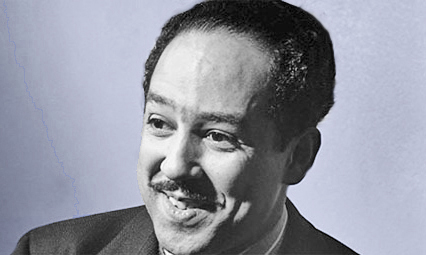
Langston Hughes and Carl Van Vechten made for unusual allies during the height of the Harlem Renaissance—Van Vechten, a white critic and devoted scholar of African American culture, befriended Hughes when the poet was twenty years his junior. Still, their correspondence spans several states, twenty years and a gamut of subjects. Hughes and Van Vechten riff on entertainment, politics and social change with equal humor and intelligence. In the letter below, Hughes recalls the scene of a party. Take note of his signature sign-off—the men typically bade each other goodbye by wishing some seasonal flower to the other.
On the train to Columbus
[November 20, 1926]
Dear Carl,
Hunter Stagg’s party was delightful. He said you wouldn’t really call it a party in Richmond but whatever it was, we had a good time—and just as at “150” the cocktail shaker was never empty. There were eight of us there—a girl and her brother, four young men, and Hunter and myself. Hunter made a new kind of cocktail of which no one knew the name, so it was christened then and there as the “Hard Daddy” after one of my Blues. The recipe is: to a glass of whiskey add one-half glass of lemon juice and a half glass of maple syrup + ice and shake. It comes out with a sardonic taste like the Blues, and before the evening was over everybody felt like whooping—and some did! “Hard Daddy Cocktails” have a great effect. If you haven’t tried them, do so soon…Everybody was very friendly and we got along famously. I had to read all the poems I had with me,— and some of them twice. About midnight Hunter went for more lemon juice and ice and a young man drove home for his Ethel and Clara records and brought back one of Paul Robeson’s, too. The girl present had never heard Paul but she went wild over him. Nobody wanted to leave but about one o’clock I had to go. I was driven back to Union University in someone’s car and the host and several others came along. Everyone still felt like shouting Yee-hoo! when we got there but we thought it wouldn’t be wise at that hour of the early morning on the campus of a Christian Baptist Institution.
Like Paul in “The Blind-Bow Boy,” Hunter is a beautiful and entertaining person who ought to draw a salary for just being alive. But I don’t believe he asked a single Southerner to his party,— not a soul refused to shake hands with me and we all had too good a time! And nobody choked in the traditional Southern manner when the anchovies and crackers went round because they were eating with a Negro. And after three, “Hard Daddys” all the glasses got mixed up. Magnolias to you,
Langston
From Remember Me to Harlem: The Letters of Langston Hughes and Carl Van Vechten, 1925-1962. Edited by Emily Bernard. New York: Knopf, 2001. p. 43-4.
Note: “The Blind-Bow Boy” is a short story written by Van Vechten, the title of which is taken from Mercutio’s address in Romeo and Juliet: “the very pin of his heart cleft with the blind bow-boy’s butt shaft” (Act 2, Scene 4).
FURTHER READING
Morris Dickstein offers some interesting background on Carl Van Vechten’s role in the Harlem Renaissance.
Go here for a nice bio on Hughes’ early career, and a brief documentary of his tours via the Biography Channel.
A description of Hunter Stagg and the milieu of his parties.


